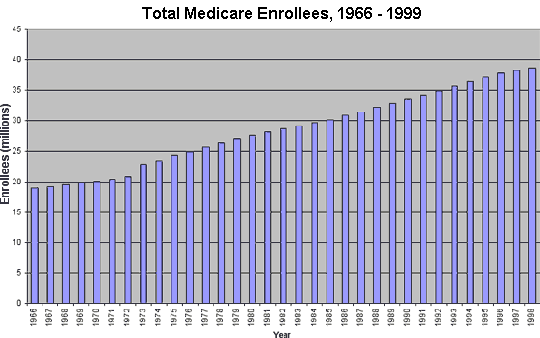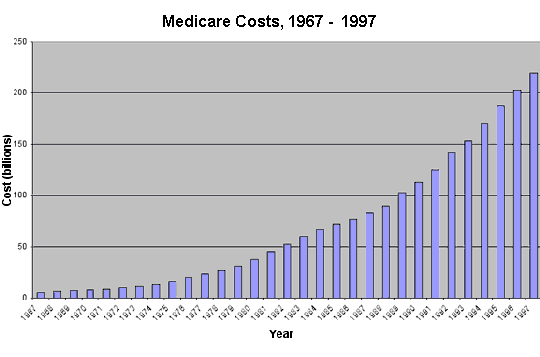| |
U.S. Healthcare: Two Reports from the Front
(February 1, 2007)
Here are two informed responses to my entry on Medicare waste. The first is from a nurse, the second from a husband
(and son) of a physician.
But first, take a quick look at these two charts. The number of people enrolled in
Medicare has risen, of course, over the past 30 years, but the rise in costs far outstrips
the increase in patients. What about inflation? OK, let's do the math. In 1980, Medicare
spent $50 billion on 28 million patients. According to the Bureau of Labor Statistics,
that translates into $122 billion today. Medicare also added 35% more enrollees
since 1980, so let's add 35% more money ($43 billion). If costs were adjusted for inflation
and the increase in enrollees, Medicare should cost $165 Billion a year--not $390 billion,
which is the current annual cost.
Do you really think we (as taxpayers and patients) are getting more than double the care
and value for that stupendous increase in cost per patient? Read on:


Our first report comes from Nurse Dorothy:
This is a reply to your medicare waste issue. I am a nurse and have first hand experience at the waste in our health care system. I'll use medications as just one example of the kind of waste I see daily. Partial doses of drugs are common for every patient. Rather than save the other half of the dose, we are required to waste it even though that patient will be needing it again (in some instances within 1-2 hours). On my shift alone I average about 5 wastes of various medications. That may not seem like a lot but I am one nurse, on one shift, with five patients. There are facilities in third world countries that have systems of medication saving that is efficient and safe. However, health care corporations would rather cut costs via large ticket items such as laying off employees, neglecting facilities and equipment, purchasing sub par products, etc. Although this routine does cut costs, you are left with overworked staff using out of date, malfunctioning, badly performing equipment.
As a side note, communication is also a huge problem in the medical community. One patient may have five doctors who know nothing of what the other doctors are doing. Doctors use progress notes as a way of communicating with each other, however, most doctors don't bother to read them or the orders they place. I go through duplicate orders all time. This broken system gives birth to patients on 10-20 different kinds of medications none of which are ever tested together to know if they actually should be given together.
Due to my experience in the medical field, I advise everyone of these three things: 1) Stay out of hospitals if at all possible, 2) Use as little medication as you can, 3) Use your brain, do your homework, question everything.
I also recommend for those who are more open minded is to try to find more natural ways of healing such as using a homeopathic or ayurvedic doctor first. Research has proven that many ancient remedies and natural methods work even better than traditional medicine with less side effects. (Digitalis, a drug millions of people are on, is from the foxglove plant which has been used for hundreds of years. Only recently has it been providing profit to pharmaceutical companies) A good homeopathic or ayurvedic doctor will know if your problem is beyond their help and will advise a traditional doctor when necessary. Unfortunately with HMO's this is difficult to do for most people, but if you have the money, go natural first.
Anyway, thanks for being my watchdog for the world out there. I have enjoyed your blog for the past year and have encouraged many of my friends to do the same. Keep fighting on!!!
Our second report comes from Richard D.:
Thoughts on health care in the USA: My wife and father are physicians. I've
spent a not-insignificant amout of time and effort helping them with their
offices. They both spend WAY too much time on "coding", i.e. deciding which
4 or 5-digit number (out of thousands) to assign to a diagnosis, procedure,
office visit, etc. They've both spent days out of the office attending
seminars about coding. Why? Because without the proper code, the govt.
(Medicare/cade) or a private insurer will deny the insurance claim or pay
less than the already discounted amout of the physician's fee.
In short, because we don't have a national healthcare system, physicians'
overhead is much higher than it should be. My relatives would love to just
care for patients, but they instead have to spend enormous amounts of time
and money determining the right code. Multiply their efforts by the number of
physicians in the US and you can see the scope of the problem. There is an
enormous amount of time and money spent in each individual office on
"coding" that could be otherwise spent on patient care. A central
single-payer system for healthcare would go a long way toward eliminating
this unnecessary overhead cost.
I'd also add that the "coding" issue is just part of the overhead issue. The
basic problem as I see it is that each physician is negotiating directly and
independently with a whole array of private insurance companies, as well as
state and federal agencies, to secure compensation for his or her services.
Each physician thus has to incur the overhead cost of hiring someone to
prepare and submit claims for payment, collect the copayments from patients,
and then follow up when the submitted claims are denied or not paid in full.
This cost is not insignificant to the individual physician. Moreover, each
and every physician is incurring the same set of costs because they are all,
in effect, independent contractors. So these costs are replicated for each
physician in the USA and add significantly to the overall cost of our
healthcare. I think moving to a single-payer system would make our healtcare
less expensive because of the significant reduction in time and effort that
each physician in the system would have to devote to billing and collection
of fees.
My wife would love to spend her time providing patient care instead of
making endless phone calls to various insurance companies to try to find out
why claims were denied or not paid fully.
Thank you, Nurse Dorothy and Richard D., for informing us of the realities
of waste and counter-productive priorities in our "healthcare" system."
Here is an "official" history of Medicare:
MEDICARE FROM THE START TO TODAY.
For more on this subject and a wide array of other topics, please visit
my weblog.
copyright © 2007 Charles Hugh Smith. All rights reserved in all media.
I would be honored if you linked this wEssay to your site, or printed a copy for your own use.
|
|



